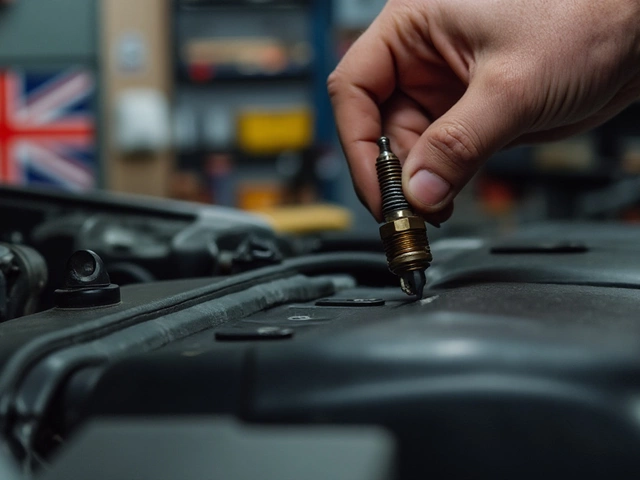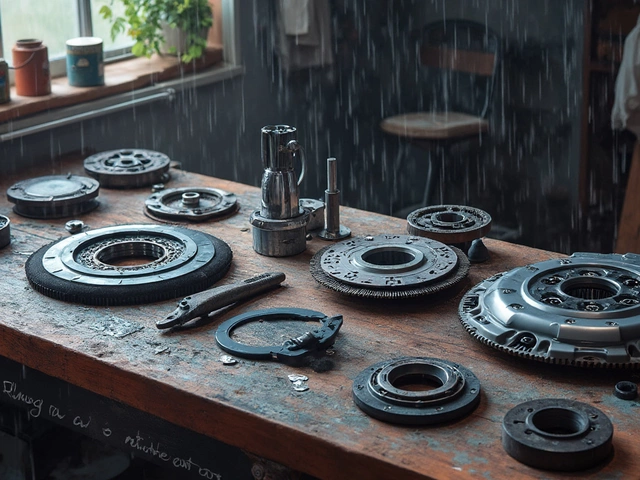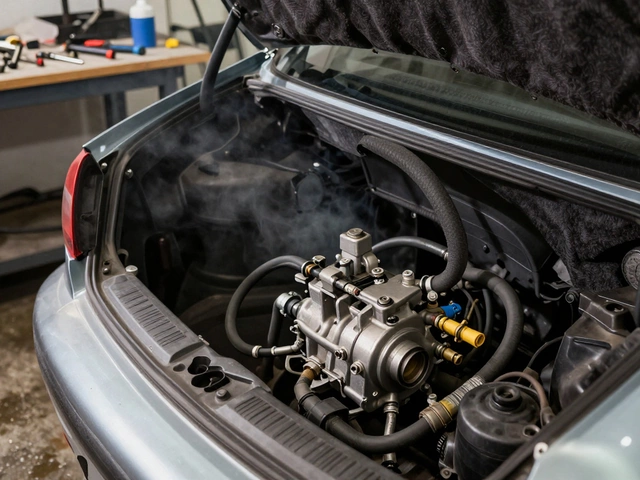Automotive woes often don’t announce themselves with fanfare but rather with a subtle hum or a quiet sputter under the hood. It’s not uncommon for car owners to panic at the slightest hint of engine trouble, often jumping to conclusions without a thorough investigation. Among the most common culprits for engine mishaps are the fuel filter and the fuel pump. These two components, while often confused, play distinct roles in how your vehicle operates.
The fuel filter, as its name suggests, is responsible for screening out dirt and impurities from the fuel before it enters the engine. On the other hand, the fuel pump delivers the fuel from the tank to the engine, supplying the essential flow of gasoline required to keep things moving. When either of these parts isn't performing as intended, your engine might experience a hiccup – or worse – leaving you stranded on the side of the road.
- Understanding Fuel Filters and Fuel Pumps
- Symptoms of a Bad Fuel Filter
- Identifying Fuel Pump Issues
- DIY Tips for Fuel System Maintenance
- When to Consult a Professional Mechanic
Understanding Fuel Filters and Fuel Pumps
When it comes to the mechanics of your car's fuel system, two components reign supreme: the fuel filter and the fuel pump. Imagining them in their roles, think of the fuel filter as the diligent gatekeeper, ensuring only the cleanest fuel reaches your engine. Usually made from pleated paper, these filters trap dirt, rust, and debris from your car's fuel system, preventing engine clogging and wear. Their strategic placement between the fuel pump and injectors ensures maximum protection for the engine's delicate parts, significantly prolonging the life of your vehicle.
The fuel pump, by contrast, serves as the powerhouse transporter, tirelessly delivering gasoline from the tank directly to the engine. It operates on an electrical system, drawing power from the car’s battery, enabling efficient and consistent fuel transport under various driving conditions. Unlike their mechanical ancestors, modern electric fuel pumps are submerged within the fuel tank itself. This placement not only keeps them cool during operation but also reduces the risk of ignition. The pump's ability to maintain specific pressure levels is crucial for fuel injection systems, avoiding engine misfires or stalling.
But how do these components work together? The fuel filter and pump are interdependent, creating a seamless flow of clean fuel crucial for engine performance. Dirt and debris can severely impact this flow; hence the filter catches these intruders before they cause harm. The pump then pressurizes the clean gasoline, directing it toward the engine's combustion chambers. As the car industry evolves, so too do these components. Innovations continue to enhance their reliability, with filters becoming more refined and pumps more powerful and energy-efficient.
"A well-maintained fuel system, by virtue of its components working in harmony, promotes optimal engine health and performance," says automotive expert Jonathan Richards.The cost of these parts is another aspect worth mentioning. While fuel filters can be relatively inexpensive to replace, often requiring a small investment of time and money, a faulty pump could demand a more significant repair cost, sometimes into the hundreds, due to its intricate placement and functionalities.
Understanding the symptoms of failure in these components can naturally save you from guesswork and unwarranted panic. For instance, while a clogged fuel filter might cause reduced engine power, difficulty starting, or decreased fuel efficiency, a failing fuel pump could result in an overheated engine, frequent stalling, or even a complete engine failure. Awareness of these signs could help diagnose issues early, protecting your wallet and ensuring your vehicle remains roadworthy at all times. So, whether you're embarking on a routine maintenance check or facing unexpected engine complications, understanding the dynamic duo of fuel filters and fuel pumps can be a priceless addition to your automotive knowledge toolkit.
Symptoms of a Bad Fuel Filter
When your car isn’t performing up to snuff, a dirty or clogged fuel filter might be the sneaky culprit. The fuel filter plays a critical role in ensuring that only the cleanest gasoline reaches the engine, blocking dirt, rust, and other contaminants that naturally accumulate in the tank over time. One of the clearest signs of a bad fuel filter is hesitation or stuttering when you accelerate. Imagine pressing the pedal at a green light, only to feel your car respond with reluctance; it’s as if the car is pausing to think about its next move. This lag is often because the engine isn’t receiving enough fuel quickly enough due to a clogged filter.
Another telltale sign is difficulty starting the vehicle. If it takes longer cranking to get your engine to fire up, the culprit could very well be a restricted filter. Misfiring is another red flag, where the engine literally coughs mid-operation, causing the vehicle to jerk unexpectedly. Worse yet, you might experience frequent stalling when the car is idling, forcing unwanted pit stops and frustration during your drives. These can all be traced back to the fuel filter, struggling to deliver a smooth flow of gasoline.
Keep a lookout for a more subtle symptom too: a noticeable increase in fuel consumption. A restricted filter can make your car engine work harder, indirectly sipping more fuel to achieve the same performance. This is not only expensive but can indicate it's time to inspect your filter. If left unchecked, severe blockages can lead to engine failure, placing you in a sticky situation which could have been effortlessly avoided.
"The fuel system should be regularly checked to avoid complications," advises the Automotive Maintenance and Repair Association, recognizing that a well-maintained fuel filter is a linchpin for a smoothly running engine.
To better encapsulate the importance, a survey by car experts found that nearly 25% of engine failures were attributed to poor fuel filtering systems. Hence, regular changes are not merely advisable—they're necessary maintenance. Routine inspections and knowing these symptoms can save you from inconvenient breakdowns and costly repairs—it's an essential part of car care that ensures longevity and performance.
| Symptom | Cause |
|---|---|
| Engine hesitation | Reduced fuel flow |
| Difficulty starting | Restricted fuel passage |
| Increased fuel consumption | Inefficient combustion |
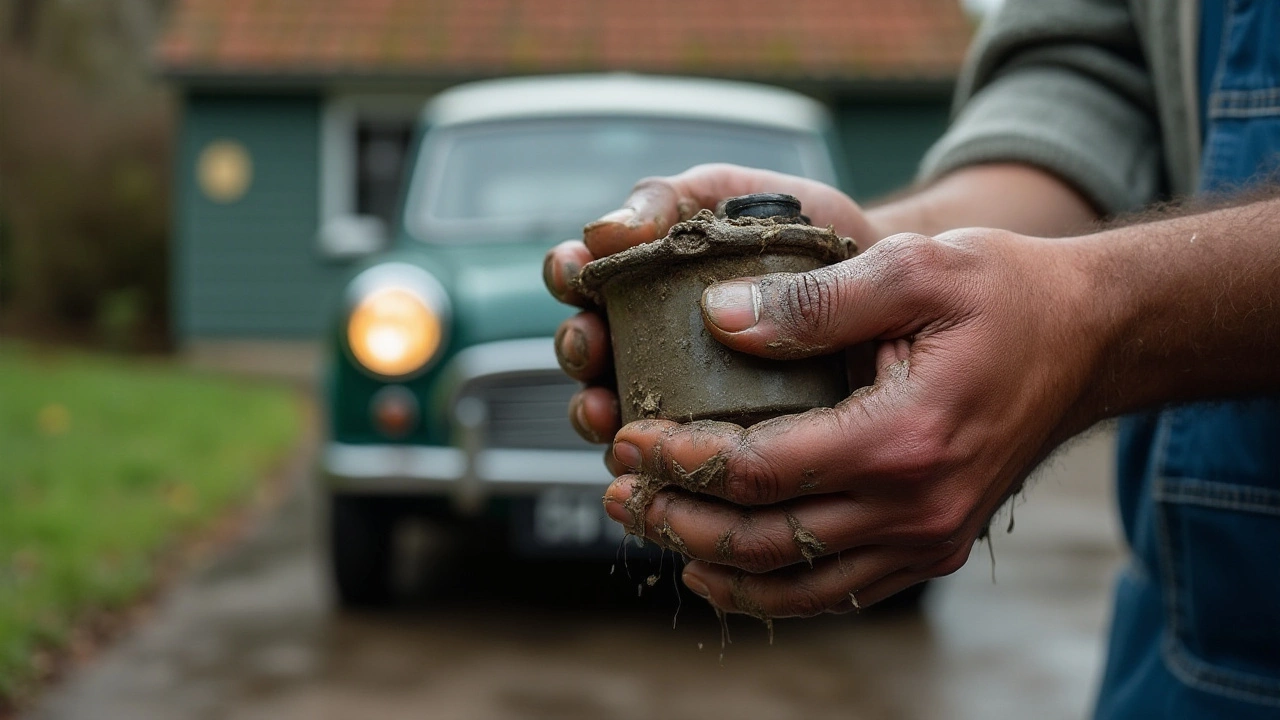
Identifying Fuel Pump Issues
When your car starts behaving like it’s had one too many cups of coffee—jerking, sputtering, and lagging in energy—it might just be the fuel pump that’s causing the ruckus. This vital component plays the role of an unsung hero, delivering the precise amount of fuel the engine needs at any given moment. But when it starts to fail, the symptoms can mimic a host of other vehicular problems, adding an extra layer of challenge to the diagnostics. It’s crucial to notice those telltale signs early to avoid any bigger, more expensive headaches down the road.
One of the primary symptoms of a struggling fuel pump is an engine that misfires intermittently. This can happen when the pump is failing to provide a steady stream of fuel to the engine, causing it to hiccup and miss beats. You’ll most likely notice this when accelerating; the car might feel like it’s hesitating to catch up with your demand for speed, almost as if it’s whispering, “I can’t keep up!” Another red flag is a sudden loss of power while driving uphill or carrying heavy loads, situations where the engine demands a higher fuel intake.
The fuel pump can also make its presence known through sound. Noises like whining or humming coming from the gas tank area are often indicative of a bad fuel pump. Imagine it as a kind of mechanical moaning, a signal that the pump is working overtime to supply fuel to the engine. If your car refuses to start at all, a defective fuel pump could be the culprit. This scenario occurs when the pump has given up entirely, unable to push fuel through to kickstart the engine. Here’s where a little detective work goes a long way: listen for the clicking or buzzing noises immediately after turning the ignition; a well-functioning fuel pump usually makes a brief sound as it starts up.
Nick Hastings, a reputable car technician once said:
"A fuel pump doesn’t just quit all of a sudden. It gives ample warnings before going kaput, just like your body warns you before you fall sick."His words underscore the importance of noticing and interpreting these symptoms before the pump decides to take a permanent break.
If you’re inclined to do a more hands-on diagnosis, testing the fuel pressure is a good move. Using a fuel pressure gauge, you can measure the pressure within the fuel system. This will reveal if the pump is operating below the optimal level required by your vehicle’s engine. Always compare the readings with the specifications detailed in your car’s manual to ensure everything matches up. This kind of measurement can be the most definitive way to confirm a failing pump, but it does require a bit of mechanical know-how.
Sometimes, resolving fuel pump problems may not even mean needing a brand-new pump. In cases where the pump filter is clogged but the pump itself is still in good condition, a simple filter replacement could save the day—and your wallet. However, if the pump is past its prime, replacing it is often the best course of action to restore reliable vehicle performance and prevent further damage to the fuel system. Always remember, a happy fuel pump means a happy car!
DIY Tips for Fuel System Maintenance
When it comes to maintaining your car's health, keeping your fuel pump and fuel filter in tip-top shape can make a world of difference. These two components are like the unsung heroes working behind the scenes to ensure your vehicle keeps running smoothly. Understanding the basic upkeep of these parts not only helps in extending their lifespan but also saves you potential headaches down the road. Regular maintenance might seem daunting at first, but with a little know-how, it becomes a straightforward task. Let's delve into some effective DIY tips that can help keep your fuel system pristine.
Firstly, consider your fuel filter. This small yet mighty part plays a crucial role in keeping dirt and sediments out of your engine, ensuring high-octane performance year-round. Checking and potentially replacing your fuel filter every 20,000 to 40,000 miles is a common recommendation, depending on your vehicle's make and driving conditions. When beginning this process, make sure your car is on a stable surface with the engine cool. Relieving the fuel system pressure is an important first step; it can typically be done by removing the fuel pump relay and starting the engine, allowing it to die naturally. Disconnect the battery before proceeding, ensuring safety as you handle the filter.
A good rule of thumb is to visually inspect the old fuel filter once dismantled. If it's clogged or appears dirty, replacing it is the best course of action. Installing a new filter involves reversing the removal process, double-checking for any leaks once installed. Remember, a clean fuel filter can dramatically improve engine performance and fuel efficiency. For those who aren't confident in replacing the filter themselves, a professional mechanic can offer a helping hand.
On the other hand, the fuel pump is equally important yet slightly more complex in terms of DIY maintenance. It sits in your fuel tank, responsible for sending gas to your engine. A faulty pump can lead to stalling, loss of power, or difficulties starting your vehicle. Keeping your gas tank at least a quarter full is a simple habit that prevents the pump from overheating and reduces the chance of early wear. Additionally, using high-quality fuel can prevent buildups that burden the pump. Should you suspect issues, a fuel pressure test is an excellent way to diagnose the pump's condition.
For a fuel pressure test, a specialized gauge can be attached to the fuel rail or the pressure test port. The readings should match the specifications outlined in your owner’s manual. If you notice any discrepancies, consulting with a mechanic for a professional assessment might be necessary. Replacements for pumps are often complex, involving lowering or removing the fuel tank, which can be difficult without the right tools and experience.
Lastly, incorporating fuel injector cleaner into your routine is a great step toward preventative maintenance. These cleaners help maintain clean injectors and fuel lines by breaking down deposits before they become problematic. Simply add them to your fuel tank as per the instructions, usually during a full tank fill-up. Regular cleaning restores optimal fuel flow and efficiency, but should not be overused as it might affect other fuel system components in high concentrations.
"Consistent maintenance with genuine parts and scheduled cleaning can often outperform the need for early replacements," advises John Riley, an automotive expert with over 20 years of experience. The simplicity of his advice rings true, emphasizing how a little care can prevent bigger problems down the line.
Whether you're a seasoned DIY enthusiast or just starting, taking the time to maintain these parts can save you money and extend the life of your vehicle. Treat your car’s fuel filter and fuel pump with the attention they deserve, and they’ll repay you with reliable performance every time you hit the road.
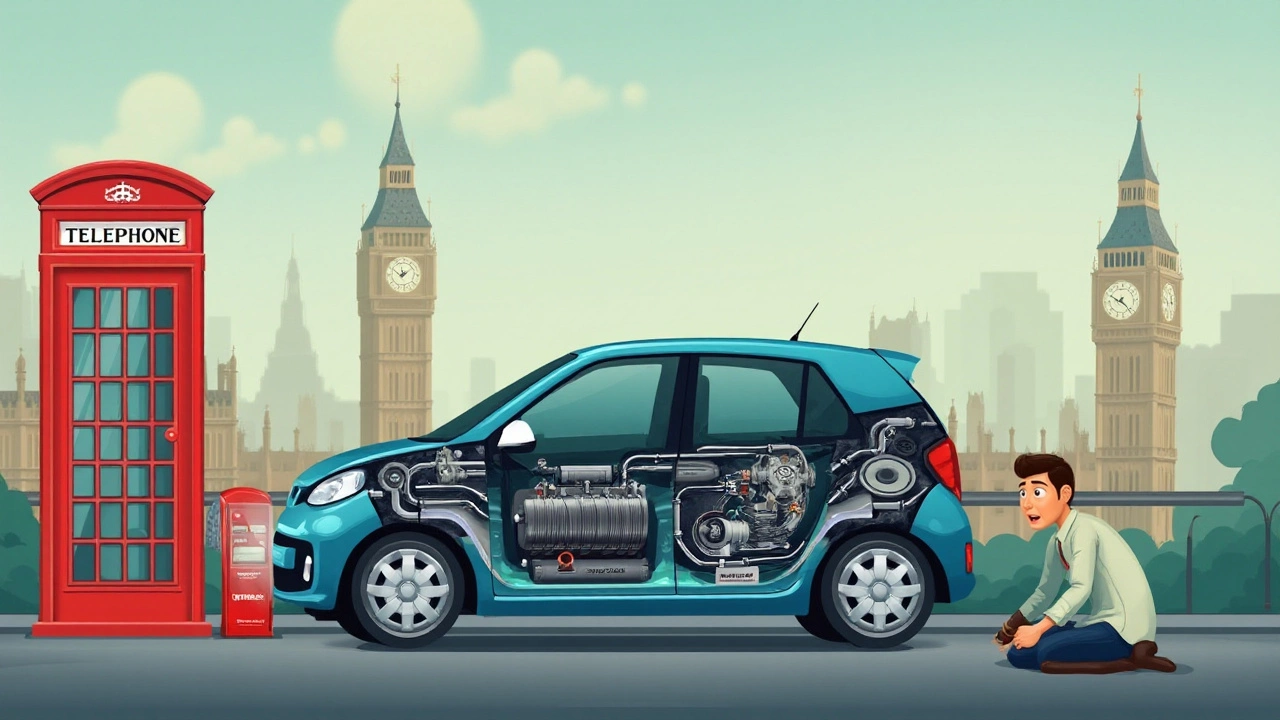
When to Consult a Professional Mechanic
At times, our cherished vehicles communicate in ways only a trained ear or eye can decipher. It's in these instances, particularly related to the complex systems of fuel filters and fuel pumps, that reaching out to a professional mechanic can be invaluable. Yet, knowing when to make that call is crucial. If you find yourself consistently dealing with engine sputtering, unexpected stalls, or a noticeable decrease in performance despite having basic mechanical skills, these could indicate underlying issues that require a seasoned expert's attention. Sometimes, DIY solutions might mask a persistent problem, but only a qualified mechanic equipped with diagnostic tools can uncover and resolve these intricacies.
Every car owner, no matter how adept, must recognize that a deep mechanical knowledge extends beyond what's covered in a manual. The fuel system, nuanced and interlinked with several other components, can be particularly perplexing. For instance, if you experience a dramatic decline in fuel efficiency without a change in driving habits, it might suggest your fuel pump isn't delivering the correct pressure or your fuel filter is blocked. Mechanics have the know-how to test fuel pressure accurately, a process often requiring specialized equipment and knowledge. According to the National Institute for Automotive Service Excellence (ASE), "fuel-related issues remain some of the most common challenges mechanics face, with diagnostics saving drivers time and expense in the long run." Knowing these tests aren't typically DIY-friendly should encourage car owners to seek professional guidance.
Moreover, modern vehicles come with intricate computer systems that provide error codes detailing specific issues. However, interpreting these codes is not always straightforward. A code related to low fuel pressure might not clearly indicate whether the issue lies with the fuel pump or the fuel filter. This ambiguity is where a trusted mechanic's expertise becomes invaluable. They can employ a logical process, often involving both manual inspection and computer diagnostics, to pinpoint and rectify the exact malfunction.
There are also circumstances where the solution's complexity simply outweighs the cost-benefit of DIY attempts. Suppose you have repeatedly replaced your fuel filter only to continue experiencing issues. This persistent problem could indicate that sediments have infiltrated deeper into the fuel system, potentially harming injectors or causing pump failure. In extreme cases, attempting to fix such problems without professional intervention might lead to more complex and costly repairs in the future, not to mention the safety concerns of incorrect installations.
In light of these considerations, maintaining a good relationship with a reliable mechanic can be an asset. They not only provide solutions but also offer preventive advice tailored to your specific vehicle type and driving patterns. Whether dealing with fuel filter replacements, fuel pump diagnostics, or routine checks, a qualified mechanic can give peace of mind and ensure you're back on the road, safely and smoothly.


